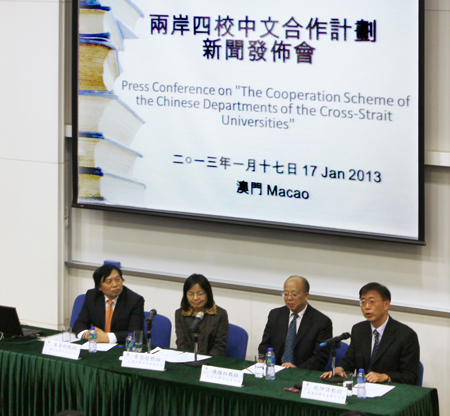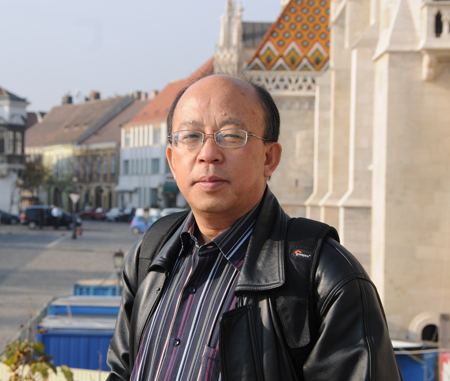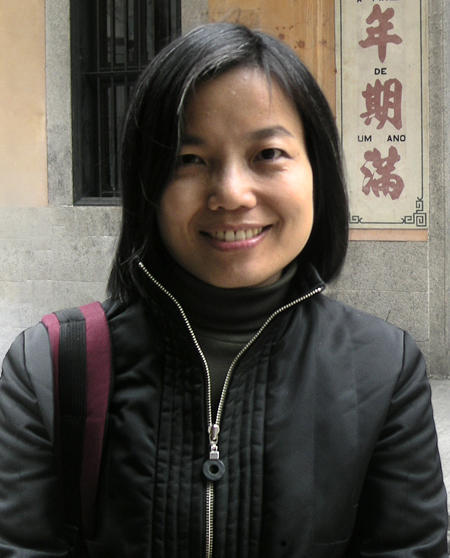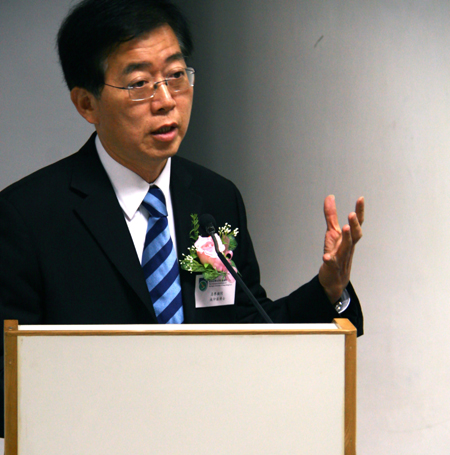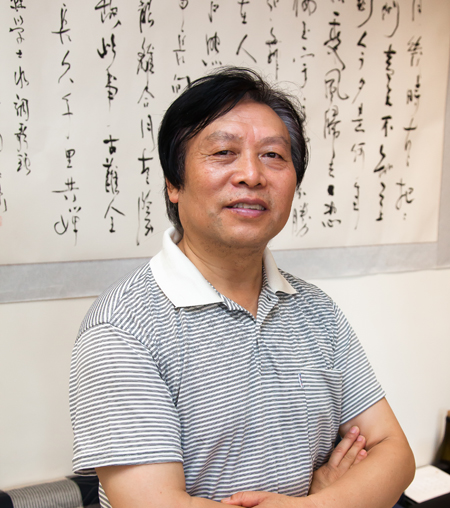Following an earlier collaboration in the establishment of a joint research centre for Chinese innovative medicines, the four universities from mainland China, Taiwan, Hong Kong and Macao (the four Chinese-speaking regions)—Peking University, Taiwan University, the University of Hong Kong and the University of Macau (UM)—launched another collaboration programme for their respective Chinese departments, in an attempt to combine their strengths, to enhance academic exchange and student training, and to promote the Chinese culture in the region and the world. This January, Prof. Chen Yuehong, head of the Department of Chinese Language and Literature at Peking University; Prof. Lee Chun-chih, deputy head of the Department of Chinese Literature at Taiwan University; Dr. C. M Si, head of the School of Chinese at the University of Hong Kong; and Prof. Zhu Shoutong, head of the Department of Chinese at UM attended the first joint meeting on behalf of their universities. They reached consensus at the meeting and later called a press conference, ushering in a new path for Chinese education in—and academic collaboration between—the four Chinese-speaking regions.
C: Prof. Chen Yue Hong, head of the Department of Chinese Language and Literature at Peking University
L: Prof. Lee Chun-chih, deputy head of the Department of Chinese Literature at Taiwan University
S: Dr. C. M Si, head of the School of Chinese at the University of Hong Kong
Z: Prof. Zhu Shoutong, head of the Department of Chinese at the University of Macau
Z: First of all, in terms of international trend, different academic disciplines are displaying different trends. The role of the Chinese discipline in the international academic framework is becoming increasingly important. In the four Chinese-speaking regions, or the Greater China region, Chinese departments must play a major role in the development of the Chinese discipline. And Macao’s unique political position and geographical location make it easier to organise and initiate such a collaboration mechanism. In this sense, we could say this is also an attempt on the part of UM to become more international through developing its Chinese education and Chinese discipline. Secondly, if we take a look at the development of disciplines at UM, we can see that because of historical reasons, the Chinese discipline at UM have already developed several modes. The Chinese discipline at UM started relatively late, so it’s inevitable that we need to choose among the existing modes, but it doesn’t mean we can’t draw on the good things from other modes of development. I think establishing such a collaboration platform is good for the Chinese discipline at UM to develop and improve.
C: I think this is also a very
meaningful attempt for Peking University. We want our Chinese education to go
beyond mainland China and to become more international, because Chinese
education is a very important part of international cultural exchange,
especially in view of the drive for modernisation. So, with this mechanism, we
could strengthen exchanges with Hong Kong, Macao and Taiwan in Chinese
education, and we could establish closer ties in student training, research,
and academic exchange. This will greatly benefit mainland universities in that
we could think about the meaning and prospect of Chinese education with a
broader mindset.
Over the past decade, we have established many channels to realise exchanges
between our Chinese department and its counterparts at other universities in
Hong Kong, Taiwan and Macao. And with this new mechanism, we will have more
channels for such exchanges, which will allow students, teachers and even
management personnel to participate. Why do Peking University and many other
universities in mainland China like exchange activities? I think Chinese
education needs a cross-cultural dimension. Chinese education needs to seek new
development under the confluence of different cultures. And I believe this new
mechanism will allow more students and teachers to participate, which will not
only advance the development of Chinese, but will also benefit us considerably.
We could see what new features Chinese education will take on with different
cultures interacting with each other. I’m very positive about such a
modernity-driven prospect.
L: I think for the Department of Chinese Literature at Taiwan University, this mechanism provides one more platform for expansion, and creates more opportunities for students to participate in overseas exchange activities. Chinese education at Taiwan University basically follows old academic traditions. So I think if such traditions could be promoted through this platform, Taiwan University will be able to exert greater influence. This mechanism will also have a very positive influence on our students because it will allow them to carry out academic exchanges with their counterparts at Peking University, the University of Hong Kong and the University of Macau. I think young people in Taiwan are too accustomed to a comfortable life to have a spirit of adventure. This [mechanism] could provide more opportunities for them to engage in exchange activities—in other words it could push them to go out. And once this becomes a popular mood, everything else that matters will take care of itself.
S: Traditionally, Hong Kong didn’t attach a lot of importance to Chinese. But there has been an about-turn on this over the past decade. Hong Kong people have come to realise the importance of Chinese. Indeed, proficiency in Mandarin has become a must-have qualification on the job market. Actually Hong Kong and Macao have always had such collaborations, but the official implementation of this mechanism will certainly make such collaborations more systematic and will certainly play a major role in advancing Chinese education in Hong Kong and Macao, especially in postgraduate education. With geographical proximity to mainland China and easy access to the outside world, and now with a new mechanism for collaboration with mainland China, Macao and Taiwan, we could really provide a good platform for students to study Chinese and broaden their horizons.
Z: First of all, this mechanism
addresses a realistic problem we currently have, which is that the existing
number of academic staff at our Chinese department, for their outstanding
academic achievements, cannot fully meet the demand of our undergraduate and
postgraduate students. This collaboration mechanism allows us to leverage the
academic strengths of Chinese departments at Peking University, Taiwan
University and the University of Hong Kong to make up for what we lack.
Secondly this mechanism provides an excellent platform for our teachers to carry
out academic exchanges in a more regular, systematic and high-quality manner,
through conferences, publications, etc. More importantly, with this mechanism,
we have role models to learn from, which will go a long way towards helping us
to strengthen our own Chinese discipline within a relatively short time.
But another thing that’s worth considering is how we position the Chinese
discipline amid the trend of globalisation in discipline management. For
instance, amid the trend of globalisation, everyone is mainly looking at
publishing in SSCI journals or English journals, which calls for the
re-identification of the unique value and status of the Chinese discipline. One
of the purposes of establishing such a collaboration platform that involves
universities from the four Chinese-speaking regions is to help people,
including government departments, to realise the uniqueness and importance of
developing the Chinese discipline as well as a very special dimension to the
international development of discipline. This is very good for the healthy
development of our discipline and is what I want to see the most.
Other Comments
Ho Sio Kam, member of the Legislative Assembly of Macao SAR
I think this programme is very good, because each university has something unique to offer. For a small city like Macao, collaboration with universities in other places will no doubt provide additional momentum that Macao needs to nurture outstanding scholars specialising in the studies of the Chinese culture. I think with basic education, including secondary school education or even primary school education, we shouldn’t give up our “roots”, which is our rich cultural heritage. But in today’s world which is obsessed with fortune and fame, disciplines like business administration and economics tend to be more popular, so I think it’s worth putting more earnest efforts in basic education.
Wong Io Man, postgraduate student of the Department of Chinese, UM
I will participate in the programme if I have the chance. I think each time you travel to a different place, you gain new experience. The University of Hong Kong, Peking University, and Taiwan University have their own unique atmospheres and ways of thinking, which are reflected in their academic programmes.
About the Four Universities’ Collaboration Programme in the Chinese Discipline
Peking University, Taiwan University, the University of Hong Kong and UM in this January held a joint meeting on the collaboration programme in Chinese. The four universities reached consensus on six matters: (1) academic and paper exchanges between academics, (2) postgraduate paper exchange and co-publication, (3) postgraduate exchange visits, (4) postgraduate summer schools, (5) mutual recommendation for postgraduate admission, and (6) establishment of a joint team of postgraduate supervisors when the time is ripe. Under this collaboration programme, students from the Chinese departments at these four universities will have the opportunity to study credit courses at partner universities, and co-publish papers at jointly-organised conferences. Academics from the four universities will have the opportunity to give lectures at partner universities. Postgraduate summer schools will be organised to provide a platform for students and teachers to exchange ideas on a given subject. Outstanding undergraduate students will have the opportunity to be recommended for postgraduate studies at partner universities. In terms of broadening students’ horizons, the four universities are planning to establish a joint team of postgraduate supervisors so that students can receive guidance from different professors to achieve greater depth and scope in their research.
(A shortened excerpt from an interview on Macau Asia Satellite Television aired on 3 February 2013)

